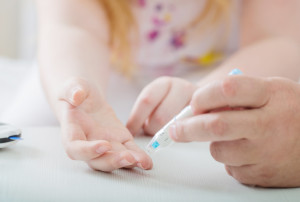 Type II diabetes gets all the press, mainly because the disease can be preventable and can often go into full remission with lifestyle changes.
Type II diabetes gets all the press, mainly because the disease can be preventable and can often go into full remission with lifestyle changes.
Type I diabetes, or juvenile diabetes, is a very different story. Scientists still don’t understand what causes Type I diabetes. About 15,000 kids are diagnosed with Type I each year and in an ironic twist, about 15,000 adults are diagnosed too, making “Type I” a much more accurate name that “juvenile” diabetes. For the 3 million American children and adults diagnosed with Type I diabetes, it’s a condition that they will never outgrow; there is no cure.
Type I diabetes is not caused by eating too much sugar, being overweight or eating too many processed foods. Type I diabetes happens when your child’s immune system destroys the beta cells that produce insulin in the pancreas. In a healthy person, the pancreas is constantly adjusting the insulin production to regulate blood sugar. In Type I diabetes, the pancreas cannot produce the insulin, resulting in uncontrolled blood sugar levels.
Symptoms of Type I diabetes include:
- Noticeably increased and extreme thirst
- Frequent urination
- Lethargy or extreme tiredness
- Fruity or sweet-smelling breath
- Dry mouth or itchy skin
- Unexpected weight loss
- Increased hunger
- Cuts or sores that are very slow to heal
Type I diabetes symptoms happen suddenly, in a matter of days, and may create a panic in you and your child. Your Alzein Pediatrics medical professionals will order one of a variety of blood tests. Your child may have to fast overnight.
If your child is diagnosed with Type I diabetes, her blood sugar levels will have to be carefully monitored several times each day. The goal of treatment is to keep her blood sugar level normal, about 80-120 mg/dL before meals, and no higher than 180 mg/dL two hours after eating. Treatment includes diet changes and monitoring carbohydrates, proteins and fats, regular exercise and weight management, and using insulin when necessary. Insulin is administered through injections or a pump, a pod of insulin connected to a catheter inserted under the skin near the stomach.
Many factors affect a Type I diabetic’s blood sugar including insulin intake, eating too much or too little, certain medications, illness, stress, puberty and menstrual cycles.
When blood sugar spikes, your child will feel very thirsty, urinate frequently, have blurred vision and may feel hungry. His breath may smell fruity or sweet, he could become confused, exhausted or begin vomiting. High blood sugar leads to diabetic ketoacidosis, when his body starts burning fat and tissue for energy, releasing toxic ketone acids, leading to coma.
When blood sugar dips, your child will feel sweaty, and may experience blurry vision, clumsiness, dizziness and have trouble concentrating. Low blood sugar leads to seizures and coma and can be fatal.
If you suspect your child has Type I diabetes, call Alzein Pediatrics at 708-424-7600 immediately for an Urgent Care appointment. We’ll check your child’s overall health, order diagnostic tests and do all we can to relieve symptoms. If your child is diagnosed with Type I diabetes, we’ll work with you and your child to create a treatment and management plan that will keep your child at maximum health.
Questions about Type I diabetes or your child’s general health? Please feel free to call; we are always happy to talk to our families!


